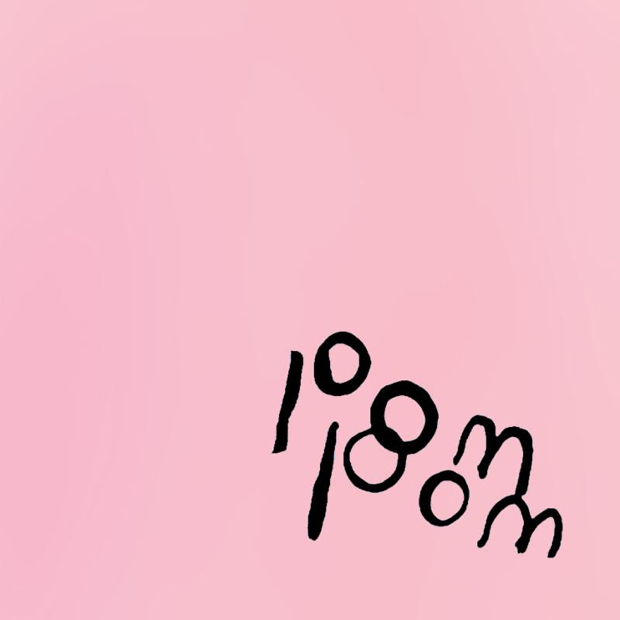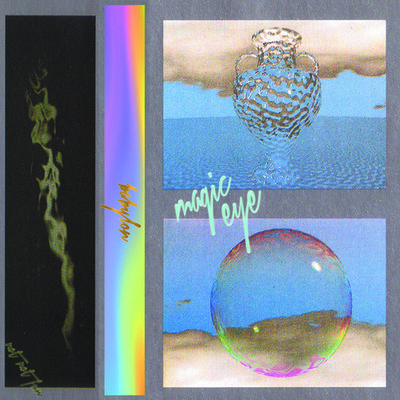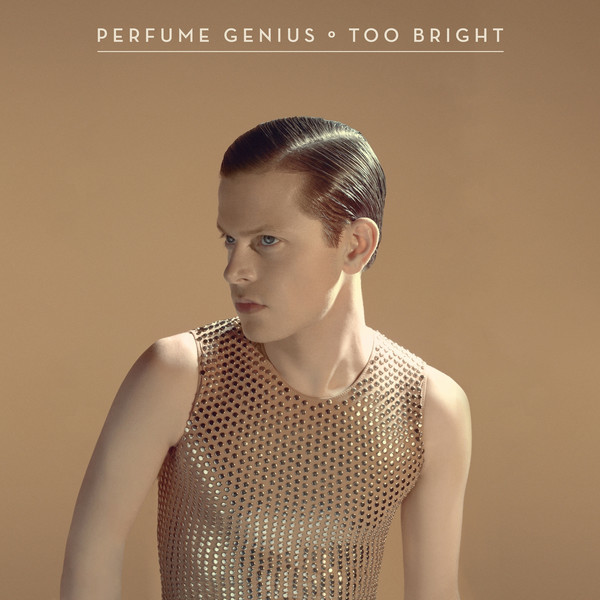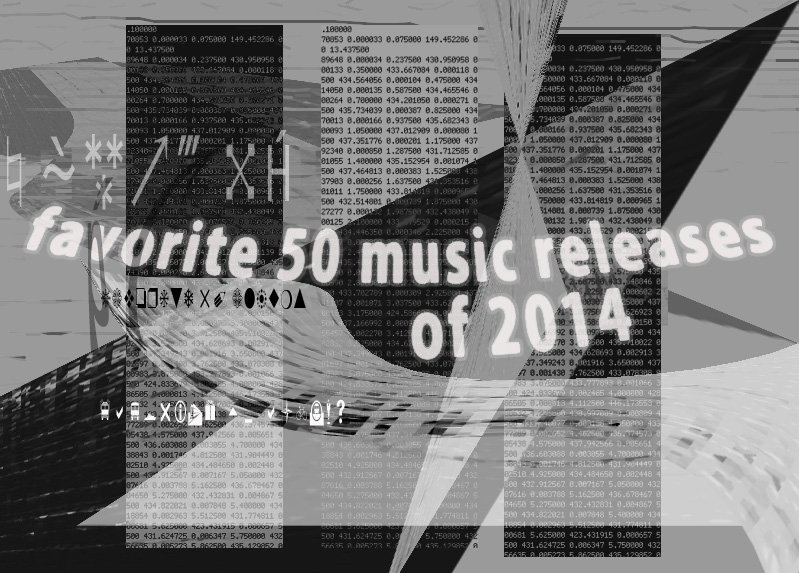We celebrate the end of the year the only way we know how: through lists, essays, and mixes. Join us as we explore the music and films that helped define the year. More from this series
30
Swans
To Be Kind
[Young God/Mute]

The opening track of To Be Kind, Swans’ third effort since their reconstitution, climaxed with frontman Michael Gira barking “Here, now!” over and over against his bandmates’ cataclysmic din — two words that summed up one of 2014’s grandest listening experiences. The album’s offerings — the haunted blues of “Just a Little Boy;” the constricted funk of “Oxygen;” the tortuous, sensuous crawl toward release that was “She Loves Us” — stifled memory and swept away vain musings on things to come. They left the listener trapped in the here-and-now, distorting that malleable space the way that a vast, empty desert warps the eye’s capacity to judge distance or scale (Did 34 minutes really just go by while we were listening to “Bring the Sun/Toussaint L’Ouverture?”). We who gave ourselves over to Swans found our position in the universe immediately clarified. In the face of their crushing, cyclical grooves, we lost our fear, our anxiety, our aspirations, our ideals. We became, for a glorious two hours, a body, an object to be acted upon. Within To Be Kind’s blessed cacophony, there was no past, no future, nowhere else we had to be. Only here. Only now.
29
Call Super
Suzi Ecto
[Houndstooth]

Originally conceived as a duo, Call Super soon became JR Seaton’s primary moniker for his bizarre techno singles. On Suzi Ecto, however, Seaton allowed himself more room to get lost in shifting weather patterns, harnessing hardware to unhurried effect. His debut album didn’t build as much as it wandered, with burbling synths, skewed analog rhythms, and his father’s clarinet and oboe all crossing paths but never fully congealing. Inspired by late-night conversations with a close friend (who subsequently passed away in January) about the negative effects technology has on humanity, Seaton tried to elucidate those paranoid theories in his music while still seeking connection. He did this by keeping things deliberately ambiguous and crafting music in the liminal zone between dance and ambience, yet he still came out managing to avoid a tag like “ambient techno.” If anything, Suzi Ecto felt like the most adaptable dance record of 2014; slippery enough to dodge shallow genre descriptors and heady backstories, but human enough to allow listeners an emotional response. Whether you heard paranoia or euphoria ultimately depended on your mood that day, which might be why we couldn’t help but keep coming back to its reflecting pool.
28
Aphex Twin
Syro
[Warp]

For the first time, every detail is accounted for: every cent spent or tuned, every mailer sent, each tempo set and shirt printed, each sine and saw and sampler fastidiously charted, a ledger of seemingly personal but largely useless data exposed ungracefully to the world for everyone to finally see. And in turn, the data betrayed us. No configuration of Korg models, compression racks, or promo funds could explain the deeply personal thing that unfolds on Syro, an inscrutable mass of melodies and beats that swing hard from the hips across every wayward melody that someone else reached for but never quite grabbed, gems of electro-funk and jittery jazz and neo-disco and classic drum & bass forged by a passionate perfectionist, grasping their essential nature and how they connect (and dissolve) intuitively and building a network of beautiful, perplexing interpretations on top. Syro was an experiment and an edit, sonic poetry from a long-missed polyglot, a bout of pure inspiration captured carefully over time, a master class in making joy out of machines. Aphex Twin has never had a definitive sound, but if he’s ever had an ethos, it has to be “don’t be boring.” Glad he’s back.
27
Ariel Pink
pom pom
[4AD]

What are you supposed to do when you’ve become someone or something completely different in just a few short years? That’s a hard thing to consider. It doesn’t help that the world has somehow become darker and more fucked up. You had to change: You can’t just fuck around anymore. Someone who you swear is your mirror image is trying to claim supremacy in your little niche, while everyone who once cared for you is turning to frauds who half-ass it. What the fuck are you supposed to do then? Well, going all out helps. But even then, it’s hard to get the words down right. Going all out with your fury and just hoping something sticks might be best. The point is to swing as hard as you can. That’s what music can be, really, especially when you’re trying to reach someone. Yeah, you’re committing acts of violence, for that’s what any song can be. But everyone is violent these days, especially in the form of gossip, shaming, threats, and other verbal assaults. You’re just willing to admit your complicity.
26
Magic Eye
Babylon
[Not Not Fun]

It’s imperfection that makes the most unlikely diamonds the most highly valued treasures of all. At least that’s what I’ve been told. With Babylon, Magic Eye smeared, blurred, and erased any preconceived notion of what pop music might constitute this year and wrapped it in a blistering glow. And yet, with its dazzling melodies, muffled sparkles, and sweeping charm, the Edinburgh trio’s latest release made for a truly intoxicating listen. There were worlds to admire through the imperfect design that each song assumed, a shimmering clutch of diamonds nestled deep within the proverbial rough.
25
Perfume Genius
Too Bright
[Matador]

Indie rock has become passé. It’s long been baptized as a tool of the establishment and has since abandoned any characteristics of independence — economic and aesthetic alike — to which it could once lay claim. In a nutshell, indie rock is pop culture, and pop culture is a dead end. All that’s left of “indie” are clichés from which to draw and a hungry market waiting to dupe the consumer, once again, into believing they’re counter-cultural. So it raises serious questions as to why we, at the end of 2014, should be celebrating an artist on such a roster, who has been appropriated as such and deemed fit for Late Night. Because music is, in the end, never as simple as that; music drives critique, not the other way around. Beyond the logic of the market, there is the illogic of the music; if the former is driven by closure, the latter is living and wild in its openness. I didn’t love Too Bright because of its cultural and market value, but because of the grace that it offered to me as a listener. Here, Mike Hadreas created a space in which rage and healing spilled out in dialectical tandem. He worked in gestures so gentle and fierce that the listener couldn’t help but participate with him, therapeutically. Above all, his queerness seeped through in both its particularity and its universality, toward the hope not just of true identity, but of reconciliation. Too Bright was, as they say, a safe space to be truly human, interdependent — not indie. And our humanity is one thing, fortunately, that even the forces of Late Night can never quite dull.
24
Jenny Hval & Susanna
Meshes of Voice
[SusannaSonata]

Like a dream, Jenny Hval and Susanna Wallumrød’s Meshes of Voice doused us in wonder. The celestial rivers of its goddess-brimming world rained milk into our soul-overwhelming thirst, and as we slept in our bone-built bodies, they glazed our eyes with honey like manna glazed the grass. And all the while, an abyssal lake waited to swallow us, a gnashing of teeth threatened to devour us, a darkness hid us from the sun: Athena, Medusa, Aurora, our savior/destroyers. Death-wisdom seemed around every turn. Would the sun rise, if we begged it? Could we cross over to the body’s end? Cataracts of sound poured through us. The seaweed skin we wore slipped off our glacial, skeletal forms. The very walls melted. But it wasn’t until the end when the surreal nightmare yielded its golden clarity. Surrendering to the undulating, caustic, creative waters of the black lake became the only option if dawn were to break. As in all initiations, Meshes of Voice only yielded its mysteries in the plunge to its depths. Your sacrifice was worth its glittering prize: the liberated, egoless, pristine voice.
23
Actress
Ghettoville
[Werkdiscs/Ninja Tune]

Around the time Ghettoville came out, I saw Actress in a gaudy neon-lit club. The sound was oddly low, the set muffled and murky, all of it wholly inexplicable to an audience that didn’t seem to know what it was there to see; long before the end, the floor had cleared, polo-shirted tourists scuttling off to the next room, and with it any remaining possibility of ecstatic release. Critics were only marginally less baffled by Ghettoville itself — but they were wrong. True, Ghettoville was oppressive and weirdly static, tracks more like vignettes than fully formed compositions, developments minimal and subtle. And if you were looking for standardized genre events like “the drop” or a chorus, then Ghettoville was uneventful, maybe even “boring.” But it was in precisely these elements where its contrarian perfection shined through. Ghettoville lived in the detritus of recently deceased civilizations, cheap keyboards, and cathode-ray televisions, humanity a trace left only in gnomic utterances on distant radio waves. It presented a hollowed-out husk of dance music, and among its raw materials of rubble, static, and emptiness, every accumulated piece of junk had value. Every now and then, something gleamed. To have confounded (disappointed?) so many expectations was itself an achievement; to have done so with such evident artfulness even more so.
22
Pharmakon
Bestial Burden
[Sacred Bones]

Bestial Burden willed itself into being. If Margaret Chardiet’s body hadn’t turned on her, we might not have received a successor to last year’s Abandon so soon. What little we knew concerning the writing process was that Chardiet underwent a sudden, necessary, and traumatic surgery and had to cancel a tour. The sound of her contending with this self-destruction was all over the album, from its opening panicked breaths on “Vacuum” to the hoarse, wet coughing fit in “Primitive Struggle.” Chardiet’s throat-shredding, lung-ripping vocals sounded like an involuntary response to the pain she was in, best exemplified at the end of “Intent or Instinct,” where we could make out the phrase “beyond language.” But we didn’t need to know all of its words: the way Chardiet pushed her voice to its limits let us know that the feeling was dire. The lyrics themselves were practically an auto-text-like response, surfacing unconsciously as a result of her situation and filled with dreadful scenarios and disgusting descriptions of feeling helpless against your somatic self. Bestial Burden was a reminder of how we’re all just walking piles of guts, and sometimes the bags holding them in spill onto the table.
21
18+
Trust
[Houndstooth]

We’ve spilled so much digital ink over the theoretical implications of cybermediated sexuality and identity enmeshed in 18+’s brilliant cobbled-from-mixtapes “debut” that there was little left to stress except for just how deep it went. A virtual pharmacological substance, Trust seeped into bodies and situations, altering them at a molecular level through ice-cold minimal R&B amygdal-level processes, flattening the digital/organic divide as it went. Turn it on and all that post-human sex was more throbbing sex and lust, another step toward an ever more fragile identity in a digital-chemical world, not as concept but as an enervating here and now.
We celebrate the end of the year the only way we know how: through lists, essays, and mixes. Join us as we explore the music and films that helped define the year. More from this series
